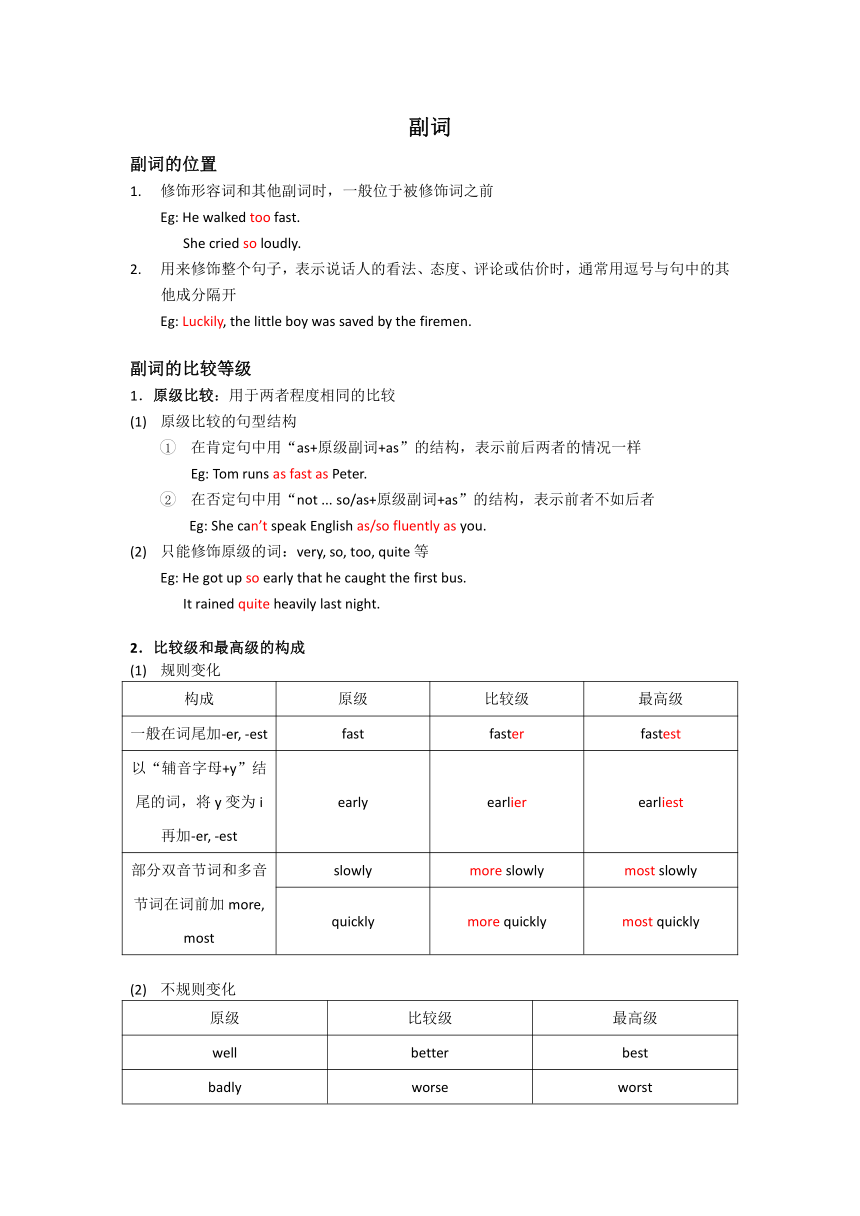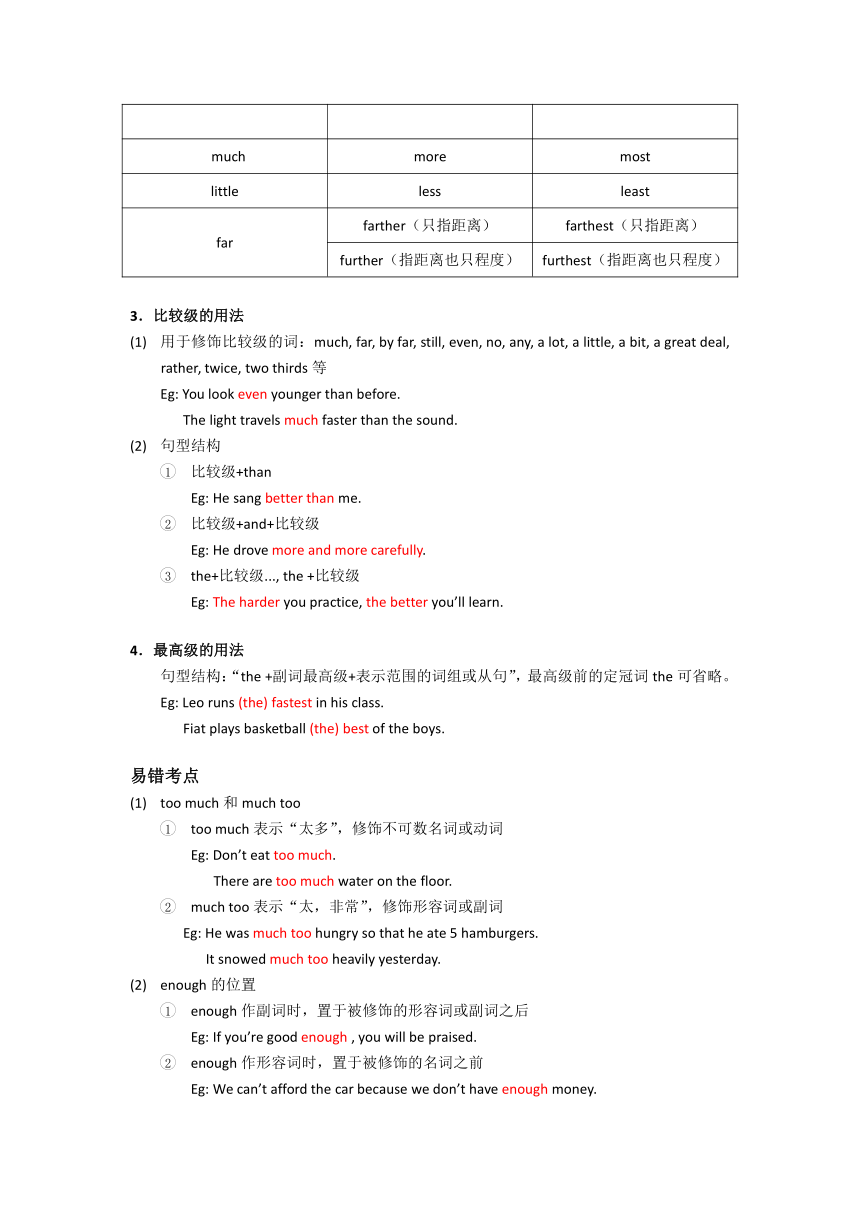2024届中考英语专项复习模块一词汇:4.副词 学案(含答案)
文档属性
| 名称 | 2024届中考英语专项复习模块一词汇:4.副词 学案(含答案) |  | |
| 格式 | docx | ||
| 文件大小 | 21.5KB | ||
| 资源类型 | 教案 | ||
| 版本资源 | 人教新目标(Go for it)版 | ||
| 科目 | 英语 | ||
| 更新时间 | 2023-08-22 13:42:05 | ||
图片预览


文档简介
副词
副词的位置
修饰形容词和其他副词时,一般位于被修饰词之前
Eg: He walked too fast.
She cried so loudly.
用来修饰整个句子,表示说话人的看法、态度、评论或估价时,通常用逗号与句中的其他成分隔开
Eg: Luckily, the little boy was saved by the firemen.
副词的比较等级
原级比较:用于两者程度相同的比较
原级比较的句型结构
在肯定句中用“as+原级副词+as”的结构,表示前后两者的情况一样
Eg: Tom runs as fast as Peter.
在否定句中用“not ... so/as+原级副词+as”的结构,表示前者不如后者
Eg: She can’t speak English as/so fluently as you.
只能修饰原级的词:very, so, too, quite等
Eg: He got up so early that he caught the first bus.
It rained quite heavily last night.
比较级和最高级的构成
规则变化
构成 原级 比较级 最高级
一般在词尾加-er, -est fast faster fastest
以“辅音字母+y”结尾的词,将y变为i再加-er, -est early earlier earliest
部分双音节词和多音节词在词前加more, most slowly more slowly most slowly
quickly more quickly most quickly
不规则变化
原级 比较级 最高级
well better best
badly worse worst
much more most
little less least
far farther(只指距离) farthest(只指距离)
further(指距离也只程度) furthest(指距离也只程度)
比较级的用法
用于修饰比较级的词:much, far, by far, still, even, no, any, a lot, a little, a bit, a great deal, rather, twice, two thirds等
Eg: You look even younger than before.
The light travels much faster than the sound.
句型结构
比较级+than
Eg: He sang better than me.
比较级+and+比较级
Eg: He drove more and more carefully.
the+比较级..., the +比较级
Eg: The harder you practice, the better you’ll learn.
最高级的用法
句型结构:“the +副词最高级+表示范围的词组或从句”,最高级前的定冠词the可省略。
Eg: Leo runs (the) fastest in his class.
Fiat plays basketball (the) best of the boys.
易错考点
too much和much too
too much表示“太多”,修饰不可数名词或动词
Eg: Don’t eat too much.
There are too much water on the floor.
much too表示“太,非常”,修饰形容词或副词
Eg: He was much too hungry so that he ate 5 hamburgers.
It snowed much too heavily yesterday.
enough的位置
enough作副词时,置于被修饰的形容词或副词之后
Eg: If you’re good enough , you will be praised.
enough作形容词时,置于被修饰的名词之前
Eg: We can’t afford the car because we don’t have enough money.
hard和hardly
hard既可作副词也可作形容词。做副词时,意为“努力地,猛烈地,沉重地”等;作形容词时,意为“坚硬的,困难的,冷酷的”等。
Eg: Students should study hard.
The problem is hard to solve.
hardly为副词,意为“几乎不,几乎没有”。
Eg: I can hardly believe it.
兼有两种形式的副词
与形容词同形的副词表示具体意义,带-ly的副词表示抽象意义,如: close和closely,deep和deeply,high和highly等
Eg: Mary stood close to her mother.
The rain storm brought people closely.
The player can jump very high.
They speak highly of the film.
too, as well, also, either
too和as well一般用于肯定句和疑问句中,常放句尾。too前可用逗号与句子其他成分隔开,as well一般不可以。
Eg: My cousin likes country music, and I like it, too.
Stan can speak English and he can speak French as well.
also主要用于肯定句和疑问句,常放句中。
Eg: Ben wasn’t the only one who knew the accident. I also knew it.
either用于否定句和否定疑问句中,常放句尾。
Eg: I can’t swim and my mother can’t either.
练习:
-The boys are talking about their vacation ______.
-Yes. They have so many fun things to share.
A. easily B. angrily C. sadly D. happily
2.-How can you prove the earth is larger than the moon
-I can't,sir.___,I never said it was.
A.Then B. However C. Besides D. Instead
3. We held a sports meeting yesterday, Kate ran_among the players,
A. quickly B. more quickly C. faster D. fastest
4. We can hardly believe that you learn to dance so ____
A.quick B. quickly C. useful D. usefully
5. I'm sorry I'm late, I should get here 10 minutes ___
A. early B. earlier C. the earlier D. the earliest
6. My younger brother is_ heavy because he often eats_junk food.
A. much too; too many B. too much; too many
C.too much; too much D. much too; too much
7.We will have to set off_____to avoid the heavy traffic tomorrow morning
A. early B.quietly C. slowly D. politely
8.-Who draws _________, Tom, Jack or Bill
-Bill.
A. good B. well C.best D. better
9.I could ________ hear what you said just now.Could you please say that again
A.sometimes B. always C. hardly D. clearly
10. Rose thinks she studies as______as her friend.
A.hardly B. harder C. hard D. more hardly
参考答案:
DCDBB DACCC
副词的位置
修饰形容词和其他副词时,一般位于被修饰词之前
Eg: He walked too fast.
She cried so loudly.
用来修饰整个句子,表示说话人的看法、态度、评论或估价时,通常用逗号与句中的其他成分隔开
Eg: Luckily, the little boy was saved by the firemen.
副词的比较等级
原级比较:用于两者程度相同的比较
原级比较的句型结构
在肯定句中用“as+原级副词+as”的结构,表示前后两者的情况一样
Eg: Tom runs as fast as Peter.
在否定句中用“not ... so/as+原级副词+as”的结构,表示前者不如后者
Eg: She can’t speak English as/so fluently as you.
只能修饰原级的词:very, so, too, quite等
Eg: He got up so early that he caught the first bus.
It rained quite heavily last night.
比较级和最高级的构成
规则变化
构成 原级 比较级 最高级
一般在词尾加-er, -est fast faster fastest
以“辅音字母+y”结尾的词,将y变为i再加-er, -est early earlier earliest
部分双音节词和多音节词在词前加more, most slowly more slowly most slowly
quickly more quickly most quickly
不规则变化
原级 比较级 最高级
well better best
badly worse worst
much more most
little less least
far farther(只指距离) farthest(只指距离)
further(指距离也只程度) furthest(指距离也只程度)
比较级的用法
用于修饰比较级的词:much, far, by far, still, even, no, any, a lot, a little, a bit, a great deal, rather, twice, two thirds等
Eg: You look even younger than before.
The light travels much faster than the sound.
句型结构
比较级+than
Eg: He sang better than me.
比较级+and+比较级
Eg: He drove more and more carefully.
the+比较级..., the +比较级
Eg: The harder you practice, the better you’ll learn.
最高级的用法
句型结构:“the +副词最高级+表示范围的词组或从句”,最高级前的定冠词the可省略。
Eg: Leo runs (the) fastest in his class.
Fiat plays basketball (the) best of the boys.
易错考点
too much和much too
too much表示“太多”,修饰不可数名词或动词
Eg: Don’t eat too much.
There are too much water on the floor.
much too表示“太,非常”,修饰形容词或副词
Eg: He was much too hungry so that he ate 5 hamburgers.
It snowed much too heavily yesterday.
enough的位置
enough作副词时,置于被修饰的形容词或副词之后
Eg: If you’re good enough , you will be praised.
enough作形容词时,置于被修饰的名词之前
Eg: We can’t afford the car because we don’t have enough money.
hard和hardly
hard既可作副词也可作形容词。做副词时,意为“努力地,猛烈地,沉重地”等;作形容词时,意为“坚硬的,困难的,冷酷的”等。
Eg: Students should study hard.
The problem is hard to solve.
hardly为副词,意为“几乎不,几乎没有”。
Eg: I can hardly believe it.
兼有两种形式的副词
与形容词同形的副词表示具体意义,带-ly的副词表示抽象意义,如: close和closely,deep和deeply,high和highly等
Eg: Mary stood close to her mother.
The rain storm brought people closely.
The player can jump very high.
They speak highly of the film.
too, as well, also, either
too和as well一般用于肯定句和疑问句中,常放句尾。too前可用逗号与句子其他成分隔开,as well一般不可以。
Eg: My cousin likes country music, and I like it, too.
Stan can speak English and he can speak French as well.
also主要用于肯定句和疑问句,常放句中。
Eg: Ben wasn’t the only one who knew the accident. I also knew it.
either用于否定句和否定疑问句中,常放句尾。
Eg: I can’t swim and my mother can’t either.
练习:
-The boys are talking about their vacation ______.
-Yes. They have so many fun things to share.
A. easily B. angrily C. sadly D. happily
2.-How can you prove the earth is larger than the moon
-I can't,sir.___,I never said it was.
A.Then B. However C. Besides D. Instead
3. We held a sports meeting yesterday, Kate ran_among the players,
A. quickly B. more quickly C. faster D. fastest
4. We can hardly believe that you learn to dance so ____
A.quick B. quickly C. useful D. usefully
5. I'm sorry I'm late, I should get here 10 minutes ___
A. early B. earlier C. the earlier D. the earliest
6. My younger brother is_ heavy because he often eats_junk food.
A. much too; too many B. too much; too many
C.too much; too much D. much too; too much
7.We will have to set off_____to avoid the heavy traffic tomorrow morning
A. early B.quietly C. slowly D. politely
8.-Who draws _________, Tom, Jack or Bill
-Bill.
A. good B. well C.best D. better
9.I could ________ hear what you said just now.Could you please say that again
A.sometimes B. always C. hardly D. clearly
10. Rose thinks she studies as______as her friend.
A.hardly B. harder C. hard D. more hardly
参考答案:
DCDBB DACCC
同课章节目录
- 词法
- 名词
- 动词和动词短语
- 动词语态
- 动词时态
- 助动词和情态动词
- 非谓语动词
- 冠词
- 代词
- 数词和量词
- 形容词副词及其比较等级
- 介词和介词短语
- 连词和感叹词
- 构词法
- 相似、相近词比较
- 句法
- 陈述句
- 一般疑问句和否定疑问句
- 特殊疑问句及选择疑问句
- 反意疑问句
- 存在句(There be句型)
- 宾语从句
- 定语从句
- 状语从句
- 主谓一致问题
- 简单句
- 并列句
- 复合句
- 主谓一致
- 主、表语从句
- 名词性从句
- 直接引语和间接引语
- 虚拟语气
- 感叹句
- 强调句
- 倒装句
- 祈使句
- 句子的成分
- 句子的分类
- 题型专区
- 单项选择部分
- 易错题
- 完形填空
- 阅读理解
- 词汇练习
- 听说训练
- 句型转换
- 补全对话
- 短文改错
- 翻译
- 书面表达
- 任务型阅读
- 语法填空
- 其他资料
